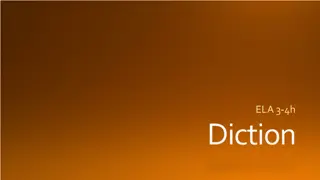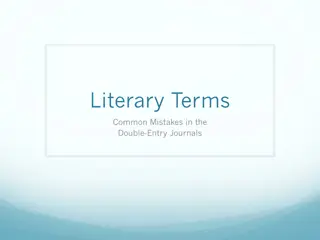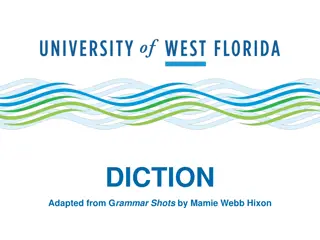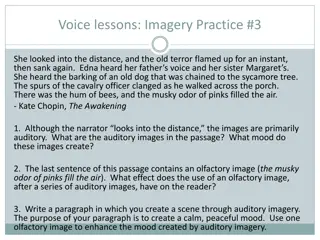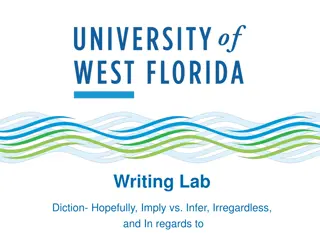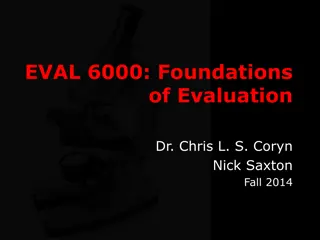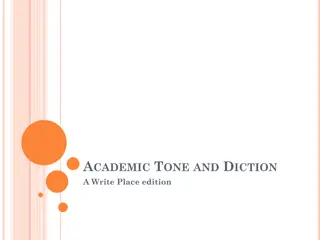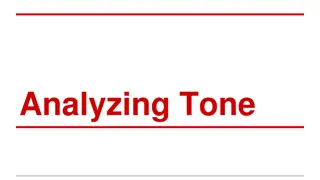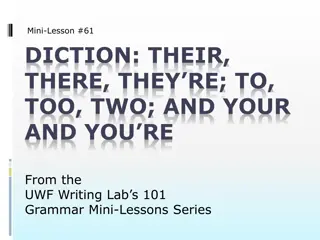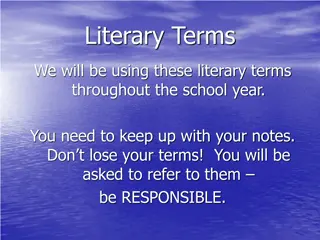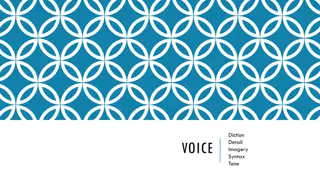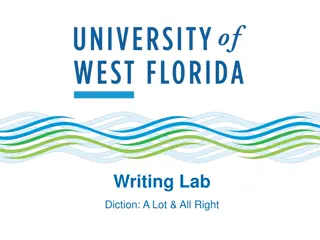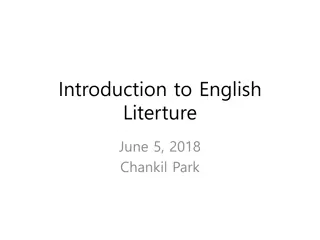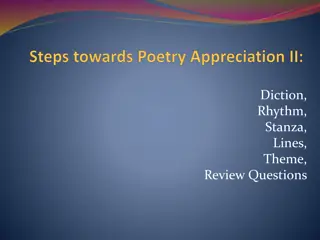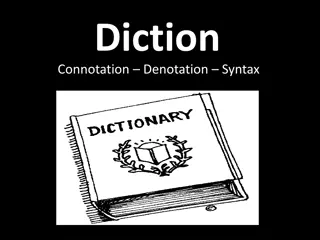Actions Emanating from the Evaluation of the Governance Reform
The evaluation of the governance reform within the WMO aimed to assess its alignment with strategic objectives, effectiveness in responding to societal needs, coordination efficiency, decision-making process, agility, and more. Evaluation criteria included relevance, design validity, effectiveness,
1 views • 13 slides
Comprehensive School Quality Assurance and Evaluation Process
A detailed insight into the Quality Assurance Department's role in school evaluation and improvement processes, including Whole School Evaluation (WSE), Follow-through initiatives, Teaching and Learning assessments, Resumption and Examination Monitoring. The process involves both internal self-evalu
0 views • 20 slides
Methods of Training Evaluation: Overview and Importance
Training and development are fast-growing fields globally, including in India. Evaluation plays a crucial role in understanding the effectiveness and efficiency of training programs for human resource development. This presentation covers the concept of training, evaluation strategies, methods/model
0 views • 61 slides
Universal Evaluation Framework: Simplifying Evaluation Processes
This session introduces the Universal Evaluation Framework (UEF) developed for evaluating QAA Scotland Enhancement Themes. Participants learn key evaluation questions, evidence capture, and the Theory of Change to enhance evaluation confidence. The QAA Scotland Evaluation Odyssey details historical
2 views • 14 slides
Implementing Blind Evaluation Pilot in HORIZON EUROPE: Key Facts and Process
HORIZON EUROPE is conducting a pilot on Blind Evaluation in the 2023-2024 work program to address biases in the research and innovation evaluation process. The pilot aims to assess the feasibility of blind evaluations in ensuring fairness and mitigating potential biases towards well-known organizati
9 views • 9 slides
Strengthening National Evaluation Capacity in the Era of Sustainable Development Goals
The presentation by Vijayalakshmi Vadivelu at the National Evaluation Capacities Conference 2017 in Istanbul focused on the importance of strengthening national evaluation capacity in alignment with the Sustainable Development Goals (SDGs). The content covers the holistic approach to national evalua
3 views • 18 slides
Exploring Developmental Evaluation for Better Decision-Making
Delve into the realm of developmental evaluation, focusing on its purpose, principles, and application in practice. Understand how developmental evaluation emphasizes real-time data collection for informed decision-making in complex systems. Learn about key principles such as developmental purpose,
0 views • 25 slides
Evaluation Practices in Macedonia: What Works, What Doesn't
The comparison between the effectiveness of evaluation practices and the presence of formal institutions in Macedonia raises questions about the impact of institutional design on outcomes. While some countries with robust evaluation institutions fall short in practice, others lacking such structures
1 views • 7 slides
Enhancing Evaluation Capabilities in Mongolia for Agenda 2030
The Mongolian Evaluation Network in collaboration with UNDP is working to integrate the 2030 Agenda into national strategies and plans, establish institutional coordination mechanisms, align budgets, and enhance data monitoring systems. Key stakeholders including government agencies, NGOs, and inter
0 views • 9 slides
Understanding Demi-Regularity in Realist Evaluation
Realist Evaluation is a theory-driven approach focusing on understanding the context and mechanisms of action behind policies and interventions. This webinar explores the concept of demi-regularity in realist evaluation, its origins, and its application in analyzing complex evidence. Key aspects cov
0 views • 16 slides
Understanding Evaluation in Education
Evaluation in education is a comprehensive term that encompasses measurement, testing, and qualitative examination of student behavior. It involves both quantitative and qualitative descriptions, along with value judgments. Differentiating from mere measurement, evaluation provides a deeper analysis
0 views • 28 slides
Sustainable Evaluation Systems Workshop Summary
Workshop on Sustainable Evaluation Systems by Stephen Porter at the NEC Conference focused on defining evaluation systems, addressing their failures, and emphasizing the importance of quality, use, and networks in achieving sustainability. Participants engaged in activities such as bingo card introd
0 views • 38 slides
Strategic Management: Strategy Review and Evaluation
This chapter delves into the critical process of strategy review, evaluation, and control in strategic management. It covers the nature of strategy evaluation, effective evaluation systems, contingency planning, auditing, using computers for evaluation, and guidelines for effective strategic managem
1 views • 42 slides
Understanding Evaluation and Ideology in Translation
Evaluation plays a crucial role in the study of translation, influencing both meaning and value in communication. This evaluation is reflected through language elements like accentuation, deletion, and substitution. Appraisal, stance, and evaluation are key terms in linguistic analysis that focus on
2 views • 22 slides
Exploring Diction in Writing: Connotation, Denotation, and Formality
Diction, the author's choice of words, is foundational in shaping voice. This content delves into diction elements such as connotation, denotation, and formality. It analyzes how words like "thirsting" and "prowling" evoke specific feelings and attitudes, giving examples from literature to illustrat
0 views • 8 slides
Common Mistakes in Literary Double-Entry Journals
Diction analysis in double-entry journals often involves discussing the author's word choice and its impact on the overall meaning. Examples from various literary works, such as Bradbury's "Fahrenheit 451," demonstrate how specific words contribute to characterization and thematic development. Under
1 views • 25 slides
Impact and Evaluation Toolkit for Churches and Christian Charities
This toolkit aims to equip churches and Christian charities engaged in small-scale social action projects to think about impact, measure impact, choose data tools, reflect on evaluation data, and use it effectively. It covers principles of evaluation, setting objectives, selecting indicators, storyt
0 views • 34 slides
Evaluation Metrics for IEEE 802.11-14/0107 HEW Proposal
Evaluation metrics play a crucial role in assessing WLAN system performance and achieving the objectives of High Efficiency WLAN (HEW). This proposal by Yonggang Fang et al. from ZTE outlines the key evaluation metrics recommended for evaluating HEW performance, including area throughput, average th
0 views • 12 slides
Overview of Monitoring and Evaluation in the GEF
The Evaluation in the GEF and Training Module focuses on promoting accountability and learning within the Global Environment Facility (GEF) through monitoring and evaluation activities. The GEF Independent Evaluation Office plays a crucial role in assessing results, effectiveness, and performance of
0 views • 25 slides
Chile Country Portfolio Evaluation 2010-2014 Summary
Evaluation process of Chile's country portfolio from 2010-2014 included pre-evaluation, during evaluation, and results/conclusions phases. Challenges like defining scope and participant concerns were addressed. Preliminary conclusions were presented to stakeholders, leading to a trustful and represe
1 views • 6 slides
Potential Amendments for Reforming REACH Evaluation Process
Discussion at the Ad-hoc Meeting of Competent Authorities for REACH and CLP focused on potential options for amending the REACH Regulation to reform the evaluation process. Topics included registration-related measures, substance evaluation, testing proposals, compliance checks, and expectations dur
0 views • 30 slides
Understanding Colloquialisms and Diction in Language Usage
Colloquialisms are informal expressions commonly used in spoken language, while diction refers to the selection of words to express ideas effectively. Learn about common colloquialisms like "could of" and "be sure and" to avoid using them in formal writing. Enhance your understanding of proper usage
0 views • 40 slides
Literary Analysis: Imagery, Syntax, Diction, and Detail in Voice Lessons
Explore the use of auditory and olfactory imagery in Kate Chopin's "The Awakening," analyze the syntactic structure in Edgar Allan Poe's "The Black Cat," understand the nuances of diction, and delve into Winston Churchill's portrayal of King Henry VIII through contrasting details. Engage with questi
0 views • 22 slides
Developing an Evaluation Work Plan for Effective Program Assessment
This presentation by Amy D. Andrade from San Jose State University focuses on developing an Evaluation Work Plan to identify responsibilities and timelines. It covers topics such as Evaluation Coaching Support, Webinar Outlines, Logic Model, Inputs-Outputs-Outcomes, Two Approaches to Evaluation, Pro
0 views • 29 slides
Mastering Diction: Imply vs. Infer, Irregardless, and In Regards To
Explore the nuances of diction with a focus on common pitfalls such as using "hopefully" incorrectly, distinguishing between "imply" and "infer," understanding why "irregardless" is not considered good usage, and learning the preferred usage of "in regards to." Enhance your writing skills by avoidin
0 views • 9 slides
Foundations of Evaluation - Conference Experience and Approaches
The Foundations of Evaluation course covers diverse topics such as improvement- and accountability-oriented evaluation approaches, social agenda evaluation, and eclectic approaches. The course material includes insights on decision- and accountability-oriented studies, methods for program improvemen
0 views • 29 slides
Evaluation Synthesis in Changing Contexts: Enhancing Knowledge for Development Effectiveness
Evaluation synthesis is crucial for promoting learning, reflection, and decision-making in development work. This process involves bringing together diverse knowledge sources to generate strategic insights and facilitate wider use of evaluation findings. The Independent Office of Evaluation of IFAD
0 views • 20 slides
Effective Writing Tips for Academic Tone and Diction
Enhance your writing skills with tips on academic tone and diction. Learn to avoid contractions, abbreviate appropriately, and steer clear of clichés and regionalisms. Improve your communication by following these guidelines.
0 views • 17 slides
Understanding Tone and Mood in Literature
Tone refers to the author's attitude towards the subject, while mood is the emotional atmosphere of the text. The difference lies in how the author feels versus how the reader feels. Understanding and analyzing tone involves considering aspects like diction, imagery, figurative language, and syntax.
0 views • 14 slides
Evaluation of FME Zero Emission Neighbourhoods in Smart Cities
The mid-term evaluation process of FME Zero Emission Neighbourhoods in Smart Cities involves self-evaluation, partner evaluation, and panel evaluation. The procedure includes scientific review, evaluation by scholars, and innovation assessment. Key documents like self-reports, progress reports, and
1 views • 20 slides
Overview of Regular Evaluation 2017 Findings in Estonia
In the Regular Evaluation 2017, efforts were made to maximize the benefits of evaluation outcomes for various stakeholders in Estonia such as the state, society, and institutions. The evaluation focused on a range of actions including preparing legislation, finding experts, creating self-report form
0 views • 6 slides
Common Diction Errors: Their, There, They're; To, Too, Two; Your, You're
Exploring common diction errors such as confusing "their, there, they're" and "to, too, two," along with "your, you're." This mini-lesson clarifies their differences and provides examples for better understanding.
0 views • 9 slides
Literary Terms Guide for Academic Year
In preparation for the upcoming school year, familiarize yourself with key literary terms such as Character, Diction, Imagery, Exposition, and more. Understand the roles of Antagonists and Protagonists, learn about Diction, Denotation, Connotation, and how they shape writing. Enhance your understand
0 views • 31 slides
Mastering Voice in Writing: Diction, Detail, Imagery, Syntax, and Tone
Enhance your writing by mastering the elements of voice - diction, detail, imagery, syntax, and tone. Discover how word choice shapes effective communication and learn the importance of clarity and precision in creating impactful writing.
0 views • 28 slides
Understanding Author's Style: Language, Diction, and Voice
Author's style encompasses various elements like syntax, diction, tone, and perspective. By analyzing how language is used, dialogue realism, sentence structure, tone, and word choice, one can determine the unique voice of the author. This guide explains how to identify and evaluate an author's styl
0 views • 17 slides
Comprehensive Guide to Training Evaluation Methods
This detailed guide covers the aim of evaluation, evaluation methods, techniques of evaluation, types of evaluation (formative, process, outcome, impact), and the significance of formative and process evaluation in assessing training effectiveness. Learn about the key principles and practices involv
0 views • 45 slides
Mastering Diction: A Lot vs. Alot and All Right
Understand the nuances of diction with a focus on common errors like "a lot" vs. "alot" and "all right" vs. "alright." Dive into the correct usage of these terms, learn informal vs. formal language distinctions, and challenge your understanding with practice exercises.
0 views • 8 slides
Understanding Diction and Denotation in Literature
Explore the concepts of diction, denotation, and connotation in English literature through an analysis of "My Papa's Waltz." Delve into the nuances of word choice, emotional coloration, and childhood experiences portrayed in the poem, questioning the expectations versus the reality portrayed. Uncove
0 views • 10 slides
Exploring Elements of Poetry: Diction, Rhythm, Stanza, Lines, Theme
Delve into the nuances of poetry with a focus on diction, rhythm, stanza formation, line arrangement, and thematic exploration. Understand how these elements contribute to the mood and meaning of a poem through insightful analysis and review questions.
0 views • 13 slides
Understanding Diction, Connotation, Denotation, and Syntax in Writing
Explore the nuances of diction, connotation, denotation, and syntax in writing through examples and explanations. Discover how word choice, emotional undertones, literal meanings, and sentence structure impact the effectiveness and perception of written work. Enhance your understanding of these key
0 views • 10 slides














